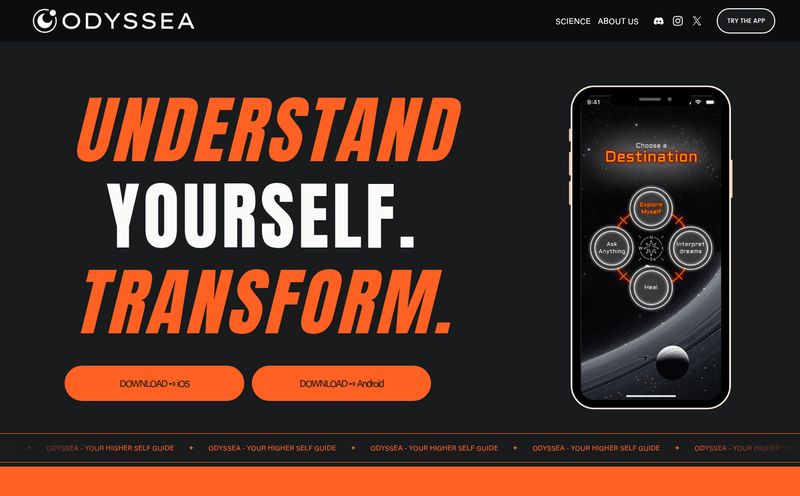We've all been there. You set a goal with all the fire and fury of a New Year's resolution. You buy the new workout gear, you download the fancy to-do list app, you tell your friends, "This is the year!" And then... life happens. The app notifications get muted, the workout gear gathers dust, and the only thing you're consistently doing is finding creative ways to avoid the thing you're supposed to be doing.
I’ve personally created a digital graveyard of productivity apps on my phone. Each one promised to be the one, but they all ended up being just another icon I’d swipe past. The problem? They're passive. They wait for you to open them. What I—and I suspect many of us—really need is a friendly, persistent kick in the pants. A personal trainer for your to-do list.
So, when I stumbled upon a tool called Dewey, my inner productivity nerd sat up a little straighter. Its premise is deceptively simple: an AI accountability buddy that talks to you over SMS. No app, no logins, no complex interface. Just... texts. Could this actually work? I had to find out.
So, What on Earth is Dewey?
At its core, Dewey is a conversational AI assistant designed to be your accountability partner. It uses the power of GPT—yes, the same tech behind the chatbot craze—to interact with you in a surprisingly human-like way. But instead of a web interface, its entire world exists within your phone's native messaging app.
Think of it less like a piece of software and more like hiring a very affordable, very punctual personal assistant whose sole job is to keep you on track. You tell it your goals, your tasks, your bad habits you want to break, and it gently (or firmly, depending on what you need) nudges you along throughout the day. It's a simple idea, maybe even a bit of a throwback in our app-saturated world, but that’s precisely what makes it so intriguing.

Visit Dewey
Getting Started: My First Conversation with a Bot Buddy
The sign-up process is, as you'd expect, refreshingly straightforward. There's no app to download from the App Store or Google Play, which is a huge plus in my book. You give it your number, and that's pretty much it. A few moments later, my phone buzzed.
"Hey! This is Dewey, your new accountability buddy."
I have to admit, there's a different psychological weight to a text message compared to an app notification. Notifications are ephemeral; we dismiss them by the dozen. A text message, however, feels personal. It feels like it requires a response. I started by giving it a simple goal: "I want to write 500 words for a blog post every day this week."
Dewey didn't just say "OK." It asked clarifying questions, helped me break down when I’d do it, and confirmed the plan. It felt less like programming a reminder and more like making a pact. This, I thought, might actually have legs.
The Features That Actually Make a Difference
While the concept is simple, the execution has a few layers that are worth talking about. It’s not just a dumb alarm clock sending you pre-written texts.
Accountability That Arrives in a Text Bubble
This is the main event. Dewey sends you personalized check-ins and reminders. Woke up and forgot you were meant to go for a run? Expect a text. Is it 3 PM and you haven't touched that report you promised yourself you'd finish? You'll probably hear from Dewey. Because it's coming through as a standard SMS, it cuts through the digital noise in a way that other tools just cant. It feels direct and personal, which is exactly what you want from an accountability partner.
Smarter Than Your Average Reminder App
Here’s where the GPT integration shines. Dewey can help you break down your bigger, scarier goals into smaller, manageable tasks. You can literally text it, "I want to learn Spanish, but I don't know where to start," and it can help you brainstorm a daily practice routine. This conversational approach to goal-setting is fantastic for people who get overwhelmed by massive projects. It's like having a brainstorming partner on call 24/7. It can also help you build habits, checking in to see if you've stuck to your new routine and offering encouragement. It's a far cry from the simple "Did you do X? [Y/N]" that older habit trackers offered.
Your Pocket-Sized Answer Engine
One of the surprisingly cool bonus features is that you can just... ask it stuff. The website even says it can answer many of the questions you'd normally ask Siri or Alexa. While I probably wouldn't use it to check the weather, it's handy for those moments when you're planning your day and a question pops up. "Hey Dewey, what are some good brainstorming techniques for a marketing plan?" It’s a small thing, but it adds to the feeling of having a genuine assistant in your pocket.
The Good, The Not-So-Good, and The Privacy Question
No tool is perfect, right? After spending some time with Dewey, I've got a pretty good feel for its strengths and where it might fall short for some users.
What I really appreciated was the sheer simplicity. The lack of an app is a feature, not a bug. It lowered the barrier to entry to basically zero. The proactive nature of the check-ins is also a huge win. Most tools require you to have the discipline to use them; Dewey brings the discipline to you. And the GPT-powered conversations feel genuinely helpful, turning it from a simple reminder tool into a real support system.
However, there are a few things to keep in mind. The entire system lives and dies by SMS. If you're someone who keeps all notifications off or you're already drowning in texts, this might just add to the noise. Its effectiveness is also tied to the quality of GPT's responses. While generally great, we all know AI can occasionally misunderstand context or give a weird answer. You have to be prepared for the occasional robotic quirk. And then there's the big one: privacy. You're essentially texting your personal goals, your struggles, and your daily plans to a third-party service. While I'm sure they have policies in place, it's a level of data sharing that some people might not be comfortable with. It's definitly something to consider before you start sharing your deepest, darkest procrastination secrets.
Who Should Text Dewey?
So who is the ideal user for a tool like this? I think Dewey could be a game-changer for a few types of people:
- The Freelancer or Solopreneur: When you're your own boss, you're also your own manager. Having an external source of accountability can be huge for staying productive.
- The Student: Juggling classes, assignments, and a social life is tough. Dewey could be the perfect study buddy to keep you on top of deadlines.
- The Habit-Builder: Anyone who's tried and failed to drink more water, meditate daily, or hit the gym consistently knows how hard it is. A friendly, non-judgmental nudge could be the missing ingredient.
- The Chronically Overwhelmed: If your to-do list feels like a monster, having an AI that can help you break it down into bite-sized pieces via a simple conversation is incredibly valuable.
It's probably not the best fit for large teams needing complex project management or for individuals who require intense, detailed progress analytics. Dewey's strength is in its simplicity and personal touch.
What's the Price for a Pocket AI Coach?
This is the million-dollar question, or hopefully, a much-less-than-a-million-dollar question. As of my review, the pricing information wasn't readily available on their website. The link to a pricing page seemed to be broken, leading to a Netlify 404 page (hey, it happens to the best of us!).
This means I can't give you a solid number. It could be a monthly subscription, a pay-per-use model, or they might still be in a beta phase. My advice is to head over to their site directly to see the most current information. I'd expect a service like this to have a recurring fee, but hopefully, it's a small price to pay for conquering procrastination.
Final Verdict: Is Dewey Worth a Spot in Your Contacts?
I came in skeptical, but I'm leaving pleasantly surprised. Dewey isn't trying to reinvent the wheel; it's just putting the wheel on a more effective vehicle. By using the simple, direct, and universal platform of SMS, it creates a surprisingly sticky form of accountability.
It’s not a magic bullet. You still have to do the work. But it effectively removes the excuse of "I forgot" or "I didn't know where to start." It’s a friendly ghost in your machine, a persistent partner dedicated to your own success. If you've tried all the apps and failed, if you know you need accountability but don't want to hire a human coach, giving Dewey a shot might just be one of the most productive things you do all year.
Frequently Asked Questions
- What is Dewey?
- Dewey is a personal assistant and accountability buddy that uses AI and SMS text messaging. It's designed to help you stay motivated, track your goals, build better habits, and manage your to-do list through simple text conversations.
- How does Dewey work?
- You sign up with your phone number and then communicate with Dewey entirely through text messages. You tell it your goals or tasks, and it proactively sends you reminders, check-ins, and motivational messages to keep you on track. It uses GPT to understand your requests and respond in a helpful, conversational manner.
- How do I get started with Dewey?
- Getting started is easy. You just need to visit the Dewey website and sign up with your mobile number. There is no application to download or install. Once you sign up, Dewey will send you a welcome text, and you can start your first conversation.
- Is my information private and secure with Dewey?
- This is an important consideration. You are sharing personal information and goals over SMS. You should review Dewey's privacy policy on their website to understand how your data is stored and used. It's always wise to be mindful of the personal details you share with any third-party service.
- I'm having trouble with Dewey. What should I do?
- If you're facing any issues, the best course of action is to look for a contact or support option on their official website. They likely have an email or a contact form for user support.
- What if I have more questions about Dewey?
- For any additional questions, visiting the Dewey website's FAQ section or reaching out to their support team directly is the best way to get the most accurate and up-to-date information.
Reference and Sources
- Dewey Official Website
- Netlify Support Guide for 404 Errors (Referenced due to broken pricing link at time of review)



